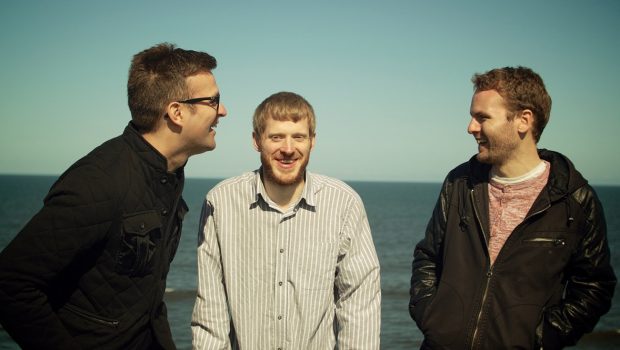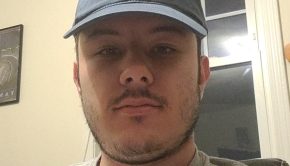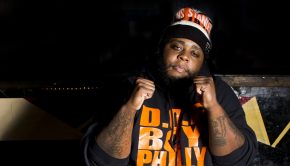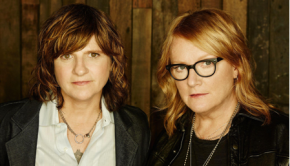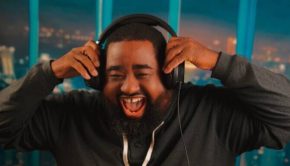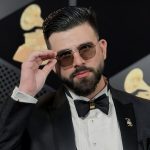The Young’uns’ Sean Cooney On The “Ballad Of Johnny Longstaff” Album & Upcoming U.S. Touring
The Young’uns began inauspiciously and organically in 2003 when teenagers Sean Cooney, Michael Hughes and David Eagle were out looking for beer one night in their hometown. They found a pub and heard music coming from the back room ultimately like no other music they had never heard before. Singing without instruments. Singing in a northern English accent. Songs about where they came from. They ultimately found out that the people in that pub had been singing in that room every Monday night for 40 years, and because the trio were the youngest people who had been in to listen to those backroom singers in quite some time, they earned the nickname “the young’uns.”
The British folk trio known as The Young’uns have been named “Best Group” at the BBC Radio 2 Folk Awards two years in a row (2015 and 2016) and are set to perform this year’s Philadelphia Folk Festival, which takes place on August 16, 17 and 18. The group’s 2018 album Strangers was dubbed “a protest album that is pointed and forceful” by the popular folk blog brightyoungfolk.com and was notably voted “Best Album” by the majority of listeners at the BBC Radio 2 Folk Awards.
I had the pleasure of speaking with The Young’uns’ Sean Cooney about the act’s latest album, The Ballad Of Johnny Longstaff, its upcoming U.S. tour — which also includes an August 19th gig at New York City’s Rockwood Music Hall, in addition to dates in New Jersey, Massachusetts, New Hampshire, Washington D.C. and upstate New York — and life as a well-regarded folk band. More on The Young’uns — including upcoming tour dates — can be found online at www.younguns.co.uk.
The term “folk music” means different things to different people. What does it mean to you?
Sean Cooney: It’s who we are and where we come from. It helps us make sense of the world, and it makes us feel alive. It knocks on doors, it breaks down walls. It’s fellowship, community, solidarity. It’s love, it’s storytelling and, for us, it’s always been about fun.
So you like being thought of as a folk band? Or is there a better way to describe The Young’uns?
Sean Cooney: Absolutely. Folk is such a big umbrella of a term these days that I think it’s harder for people to make a judgement about you solely on the fact that you are a folk band. Perhaps when we started out, it was more common for people to think “I don’t like folk so I won’t like you” without ever listening to our music. I think less people would say that these days. We’re proud to call ourselves a folk band.
Many of your songs are about real people, real situations and real events. How do you find and decide what you will write a song about? and please give some examples.
Sean Cooney: Some of the songs we write are inspired by stories we’ve seen in newspapers or in the press. Stories that have really resonated with us. In 2015, I read the heartbreaking story of Matt Ogston who had recently lost his same-sex partner Naz Mahmood to suicide. This was brought about in part by the reluctance of his religious family to accept his sexuality. It was heartbreaking to read how their 13- year relationship was cut short so tragically. It was Matt’s incredible determination and bravery in the aftermath of losing Naz that inspired me to write. He set up a charity — the Naz and Matt Foundation — and began touring Britain, going into churches, colleges and communities, reaching out to people. Sharing his story, however difficult it was to tell and however difficult it was for people to hear. He bears an incredible message of hope.
I knew after reading the article that morning in 2015 that I wanted to write a song about Naz and Matt because it had moved me so much. It was an incredibly daunting prospect, and I wondered if I really should. I knew deep down that I should do it because Matt’s whole life is about sharing his story, and that’s what I wanted to do. It took a year of careful thinking before I had a spark and began. I took great care to keep true to every interview I had watched of Matt’s and every article I had read about him. In early 2017, the song “Be The Man” was complete. Sending the song to Matt and waiting for the reply was an incredibly anxious experience. After a week, I received an incredibly-emotional, thankful reply. We performed the song for the first time at the Glastonbury Festival 2017. Shortly afterwards, we went to meet Matt in person for the first time; the film we made with him is here: https://www.youtube.com/watch?v=pTyFN0J07bM. Michael asked Matt what he thought the first time he heard the song. “It was like I had written it myself,” he answered.
We feel incredibly privileged now that many people send us stories or suggest things we should write and sing about. In May 2015, an old man in the south west of England approached us carrying a picture of his late father. He told an extraordinary tale of a boy who walked out of poverty, who stood up to Fascism, who witnessed some of the most momentous events of the 20th century. His name was Johnny Longstaff. Johnny’s son Duncan had come to see us that night hoping we might be persuaded to write a song about his incredible Dad. We ended up writing 16 songs, putting together a whole theatre show and releasing an album in December 2018 called The Ballad Of Johnny Longstaff.
Sean Cooney: Our only trip to the U.S as a group was to attend the Folk Alliance Conference in Kansas City in 2015. Folk Alliance is a wonderful event where hundreds of performers from all over the world take over a hotel in North America every February. Beds are removed from every room on certain floors and hundreds of concerts take place simultaneously. Promoters and people who run festivals walk down the corridors, seemingly all night long, popping in and out of each room listening to great music. There’s music popping up everywhere you go — in the lobby, on the escalators, in the bathrooms. It’s quite something.
Outside of our musical life, Michael is definitely the most well-travelled of our group. He’s been all over the U.S. He loves San Francisco.
What are you most looking forward to seeing in the States?
Sean Cooney: I’ve always wanted to go to New York and pretend I’m Woody Guthrie or [Bob] Dylan arriving for the first time. Hopefully, I’ll get to Greenwich Village. We’re really looking forward to playing in the States for the very first time. We’re looking forward to meeting people, talking to people and hearing their stories.
The Ballad Of Johnny Longstaff is your latest release. So how long did you spend writing and recording it?
Sean Cooney: It was three years in the making. After meeting Duncan Longstaff in 2015 and hearing the story of his dad, I knew I wanted to write something. We soon discovered that before Johnny died in 2000 he recorded his story in his own words, and it was all available to listen to at the Imperial War Museum in London. After listening to the six hours of Johnny’s material, it was quickly clear to us that we shouldn’t write one song but a whole suite of songs chronicling all of the amazing things Johnny did in his youth — from walking 240 miles to London on a Hunger March when he was 15, taking part in the Battle of Cable Street in 1936, being smuggled out to fight Fascism in the Spanish Civil War when he was 17, and so much more.
We’d been inspired by the groundbreaking BBC’s Radio Ballads Of The 1950s, which wove original songs around the oral testimonies of real working people. We thought we could do the same with Johnny and his incredible story and that anything we’d create would have to have Johnny’s own voice at the heart of it. By 2018, we had 16 songs and had created a live theatre show, The Ballad Of Johnny Longstaff. The album followed in December 2018.
Sean Cooney: “Any Bread?” was the first song written in November 2015. It’s the first song on the album and tells the story of Johnny’s childhood. When he was an old man, Johnny wrote his memoirs. Unfortunately, they’ve never been published. He called them “Any Bread Mister?” and explained in the opening lines why… “Any bread left mister, any bread left?” came these words from children, who were waiting at the factory gates for the few employed men who had finished work for the day, and were walking out of the factories in Stockton On Tees. Sometimes the workers gave us some food; they had deliberately saved this food from their lunch boxes to give to us hungry youngsters. The look on their faces was one of sympathy; even we young children understood the look and the expression these men had on their faces.
Do you have a favorite song on The Ballad Of Johnny Longstaff?
Sean Cooney: I love singing the “Hostel Strike.” It was one of the last songs I wrote about Johnny. It tells the story of how he inadvertently organized a strike in a YMCA youth hostel in 1934 when he was 15 years old after being given some appalling sandwiches. Johnny always stood up for himself. He didn’t even know what a strike was. I wanted the song to be fast and bouncy and full of fun. It was a lot easier writing it than singing it, and we had a hilarious time trying to learn the words which come thick and fast and twist the tongue.
-Do you enjoy performing the album in its entirety?
Sean Cooney: The Ballad of Johnny Longstaff is a live theatre show and features visuals, narration as well as the songs and, of course, Johnny’s voice. Performing it is always an emotional experience for us. Audiences really connect with it. They hear Johnny’s voice, and they’re warmed to it. It’s the voice of their past. It’s a really moving thing. At the end of the show, Johnny sings and we sing along. It’s a beautiful thing for us to be able to do. The really special nights have been when Johnny’s family have been in the audience. The first tour culminated in the hometown we share with Johnny, Stockton On Tees. 15 of Johnny’s descendants were in the front row. At the end of the show, we told the audience who they were, and they received a standing ovation. There were many tears.
This is the piece I wrote for the Guardian earlier in the year with more details about the project: https://www.theguardian.com/music/2019/feb/04/johnny-longstaff-a-forgotten-hero-the-spanish-civil-war-fighter-the-younguns-folk.
Have you already started working on your next album or EP? Or is it too soon because The Ballad Of Johnny Longstaff is very new?
Sean Cooney: Yes, we’re already writing songs for the next album. The world’s full of amazing people doing wonderful things and to be able to tell their stories is a really important thing for us.
When not busy with the band, where does your free time go?
Sean Cooney: We’ve all got different things we do in our free time. David has a burgeoning career as a stand-up comedian and recently got through to the final rounds of the BBC New Comedian Of The Year competition; the final is the day before we fly to Philadelphia! I’ve recently been commissioned to write songs to mark the 200th anniversary of the Peterloo Massacre in Manchester, a pro democracy protest that was violently broken up by soldiers resulting in the death of 15 people.
What was the last concert you attended for fun?
Sean Cooney: All the concerts I’ve attended recently have been with my 14-month-old son. Where we live in Sheffield, there’s a great group called Concerteenies who persuade professional musicians to come and perform to babies and toddlers. They don’t play kids songs. They play what they normally play and it works. We love it.
Finally, Sean, any last words for the kids?
Sean Cooney: I couldn’t sing when I was a kid. They wouldn’t let me play an instrument at school. I couldn’t get in the choir. Music was for other people. Hearing folk songs sung by ordinary people when I was a teenager changed my life. You didn’t have to play an instrument. You could sing in your own accent. It was OK to forget the words every now and again. It was so real and so honest I found my voice in that folk club and it changed my life.

